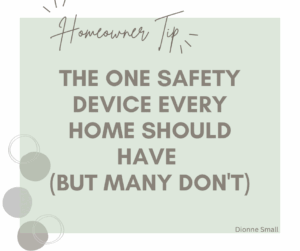
We all depend on appliances like furnaces, stoves, fireplaces, and even cars in our garages, but what many homeowners don’t realize is that these can create a hidden danger in your home: carbon monoxide.
Carbon monoxide (CO) is often called the silent killer because it’s colorless, odorless, and tasteless. You can’t see it or smell it, but it can be deadly. That’s why having working CO detectors in your home is so important.
How Many Detectors Do You Really Need?
If your home uses any fuel-burning appliances, you need CO detectors. And not just one. The National Fire Protection Association recommends a detector on every level of your home and near sleeping areas. For a typical three-bedroom, two-bath home with an attic and basement, that means four detectors.
Where Does CO Come From?
Some common culprits include:
- Gas furnaces, stoves, ranges, hot water heaters, or fireplaces
- Woodstoves, pellet stoves, or traditional fireplaces
- Cars running in attached garages (even just to warm up on a cold morning)
If something goes wrong with any of these, CO can start circulating throughout your home quickly.
Keep Your Detectors in Good Shape
Having detectors isn’t enough, you need to keep them working.
- Replace detectors every 5–6 years (check the date stamped on the back).
- Look for the UL (Underwriters Laboratories) symbol so you know it’s been tested.
- Swap out batteries at least twice a year (daylight savings is a good reminder).
- Consider hardwired or plug-in versions for added reliability.
What Homeowners Should Know About State Rules
Some states require sellers to install carbon monoxide detectors before selling a home. Others require landlords to provide them for tenants. And in some cases, sellers must disclose whether the home has fossil-fuel appliances and if detectors are already installed.
That means if you’re buying a home, it’s important to confirm detectors are in place—or plan to install them yourself right away.
Why This Matters
CO poisoning is serious. Mild exposure can cause headaches, nausea, dizziness, and flu-like symptoms without the fever. Severe exposure can lead to brain damage or even death. Children, seniors, and those with heart conditions are especially at risk.
Unfortunately, every year tragic stories surface during the colder months when heating systems are running nonstop. Many victims never even realize what’s happening until it’s too late.
How to Protect Your Family
- Get your appliances inspected regularly.
- Make sure your chimney is clear and venting properly.
- Never use a grill inside your home or garage.
- Don’t run a car inside an enclosed garage, even briefly.
- Ensure space heaters are used only in well-ventilated areas and never overnight.
Take a few minutes today to check your home. Do you have a CO detector on every level? Are they up to date? If you’re not sure where to start, I can help connect you with resources and trusted service providers in your area.
Hi, there!
I'm Dionne and I love educating and empowering first time home buyers and sellers so their first experience is their best experience.
Let me know how I can help you make your real estate dreams come true.
Let's Meet
Contact
(678) 628-5887
hello@dionnesmall.com
seller
buyer
homeowner
All Articles
schedule your complimentary consultation
(770) 640-6800